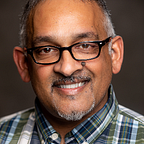Equity in Math Education: Searching With My Good Eye Closed
In 1992, the band Soundgarden released an album which contained the song “Searching With My Good Eye Closed”. While naturally there are various interpretations of the song, many — including myself — saw the song talking about how many of us wander around rather aimlessly in life, taking cues from established authority, and as such, unwittingly shoulder some social indoctrination of how things are. And, how things should be…
When it comes to mathematics and math education, things have been par for this indoctrination course. In spite of some scholarly research and books, the general narrative that drips down into society is that mathematics has been predominately in the domain of white males. While the history of that in terms of European contribution after 1500 is true, it is not true before that. And women have had historical discrimination, too often relegated to the margins of history, and not given space and encouragement to escape the relegation of footnotes.
In 1807, the great mathematician Carl Friedrich Gauss found out about Sophie Germain through a critical intersection of broader history. Napolean’s army was invading the area that Gauss lived in. The General who was leading that invasion was a personal friend of Sophie, and she requested that Gauss’s safety was ensured. After finding out about this and that the true identity of Monsieur Le Blanc was indeed Sophie Germain, Gauss penned this letter.
It is something that every math teacher should read to every student.
Mathematics is unique, and so is its long, long history of global contribution. And frankly, if we want to go forward with the needed humanity in math education, we need to look backwards as well. There is no better resource to start with then Crest of the Peacock by George Gherveghese Joseph.
I was gifted the first copy — signed — by my teaching mentor/friend, Peter Harrison, in 1999. I have started rereading the expanded third edition — a massive compendium ringing in at over 500 pages — just this past summer.
Equity in math education, thankfully, will continue to be the pressing topic it is for decades to come. The problem is that our current search, earnest as it can be with the amalgam of our strengths, continues neglecting a historic weakness that the math education community has been guilty of — the actual history of mathematics.
While the discussions of equity in mathematics have thankfully heating up, from my perspective I don’t see the discussions venturing outside of the present conditions of math education’s infrastructure and barriers to success. These are all critically important, and having social lens on the identification of these biases and solutions is paramount. But, they are paramount in general.
Which is unbelievably ironic, since the predominating mandate to come out of the discussions and examinations is the whiteness of mathematics, is that the energy to make it less so is making a feeble attempt to go to the actual well of its cultural and racial diversity — the actual history of mathematics.
This is not only a gross miscalculation of the larger landscape of equity, it is worse, an indictment of the conservatism, power structure, and pragmatism that plagues and handcuffs the movement of those that desire a deeper probe into why and what we teach — the actual history of mathematics.
There you go. No more elephants in the room. Our approach to math equity can be not wrongly perceived as soulless. And, the Twitter interactions that I have had with people inside and outside the educational community testify to that. Part of the friction is that there are people in the “Woke” community that overlap with math education. The whole equity addressing/dismantling of the generally white, male infrastructure of power in math education — a good thing — is sadly, creating another infrastructure of power, status, and ego.
Equity is creating a rather unspoken gate keeping of what is equity and who gets to lead the discussions. There is a sweeping sense of entitlement as to the vector calculations of the equity discussions — direction and velocity.
Well, if we don’t slow down, start getting beyond the political posturing and social media call outs, and re-calibrate the dialogue to include the actual history of mathematics, we are going nowhere. Fast.
You don’t have to any knowledge of math history to participate — only an earnest desire. We are at a critical and exciting juncture in math education where supposedly a full audit of it is taking place. But, if in that examination we fail to address the actual mathematics and its deep and colorful history, the we are disqualified from saying that this audit is anything but full. And again, the most important reason this has to take place is the impact it will have in the students in our classrooms.
When it comes to math history, WE are all learners. I have spent 20 years looking at it, and I don’t think I have made a dent into what is out there — back there. But, if there is any humanity and joy to be recaptured in math education, WE need to act as a community that believes in this heavy lifting of looking in the rear view mirror — which is really uplifting in the end.
If not, it will be Searching With Our Good Eyes Closed…
Again.
